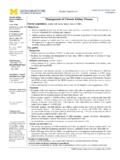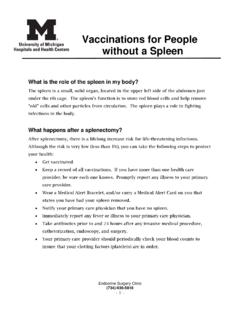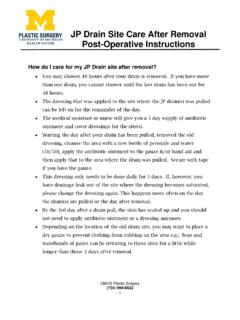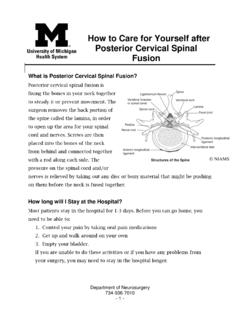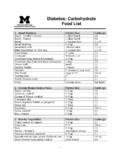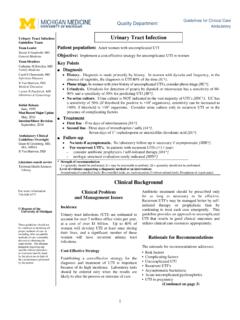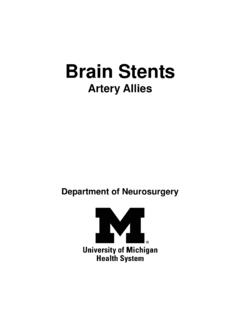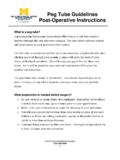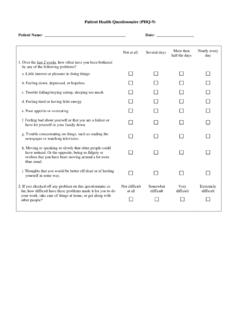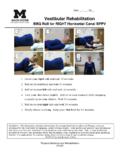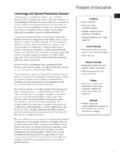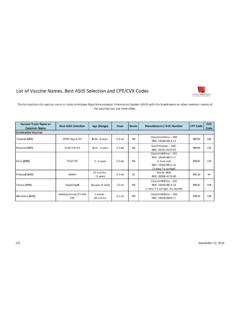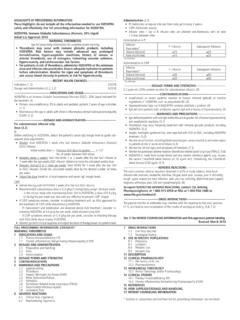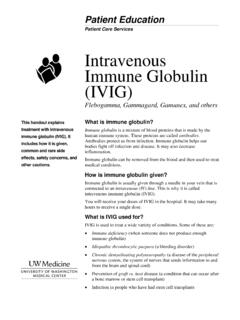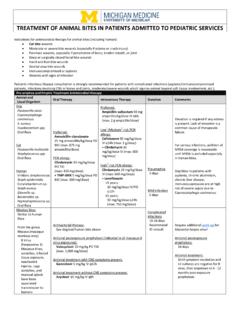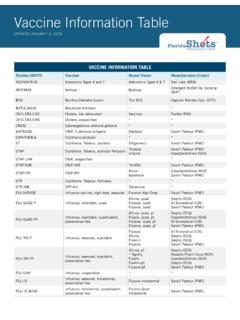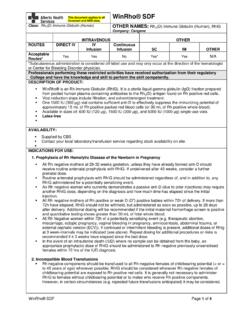Transcription of TREATMENT OF ANIMAL BITES IN PATIENTS ADMITTED TO …
1 TREATMENT OF ANIMAL BITES IN PATIENTS ADMITTED TO ADULT SERVICES. Pre-emptive and Empiric TREATMENT Antimicrobial therapy ANIMAL and Oral Therapy Intravenous Therapy Duration Comments Usual Organism Dog Pasteurella canis Capnocytophaga canimorsus Elevation is required if any Preferred Preferred S. aureus edema is present. Lack of Amoxicillin-clavulanate Ampicillin-sulbactam 3 g Fusobacterium spp. elevation is a common cause of 875-125 mg PO BID IV q6h Oral flora therapeutic failure. Mild PCN Allergy (rash) Mild PCN Allergy (rash). Cat For serious infections, addition Cefuroxime 500 mg PO Ceftriaxone 1 g IV q24h Pasteurella multocida of MRSA coverage is reasonable BID + Clindamycin 600 mg IV.
2 Staphylococcus spp until MRSA is excluded + Clindamycin 450 mg q8h Oral flora especially in human BITES . PO TID. Severe PCN Allergy human Dog BITES in PATIENTS with Severe PCN Allergy Levofloxacin 750 mg Viridans streptococcus asplenia, chronic alcoholism, Doxycycline 100 mg PO PO/IV daily (PO. Staph epidermidis chronic liver disease, BID preferred). Corynebacterium sp. immunosuppression is at high + Clindamycin 450 mg + Clindamycin 600 mg IV. Staph aureus risk of severe sepsis due to PO TID q8h Pre-emptive Eikenella sp. Capnocytophaga canimorsus Bacteroides sp. 3 days Peptostreptococcus sp.
3 Oral flora Mild infection Require additional work-up for Antibacterial therapy: 5 days Macacine herpes virus i See dog/cat/ human bite above Antiviral postexposure Antiviral postexposure prophylaxis (indicated in all prophylaxis: macaque B virus exposures): Monkey BITES Complicated infections 14 days Valacyclovir 1 g PO TID. Similar to human 10-14 days flora Recommend ID consult Antiviral TREATMENT : Antiviral TREATMENT with CNS symptoms present: Until symptom resolution and Ganciclovir 5 mg/kg IV q12h 2 cultures are negative for B. virus, then stepdown to 6 - 12. Antiviral TREATMENT without CNS symptoms present: months post-exposure Acyclovir 15 mg/kg IV q8h prophylaxis Non-meat eaters Pig In 2015 according to the CDC, Ferrets / weasels 5,508 cases of ANIMAL rabies Horse Same as dog and cat Same as dog and cat were reported, involved Sheep wildlife.
4 Major ANIMAL groups Raccoons were as follows: Skunks Bats Raccoons Skunks Meat eaters Foxes Bears Cats Coyote / Wolf Same as reptiles Same as reptiles Cattle Bobcat Dogs Fox ANIMAL and Oral Therapy Intravenous Therapy Duration Comments Usual Organism Preferred Preferred Amoxicillin-clavulanate Piperacillin-tazobactam 875-125 mg PO BID g IV q6h Reptiles Mild PCN Allergy (rash) Mild PCN Allergy (rash). (Iguana, turtle, lizard) Cefpodoxime 400 mg Ceftriaxone 1 g IV q24h Oral flora PO BID + Metronidazole 500 mg For serious infections, addition Salmonella spp + Metronidazole 500 IV q8h of MRSA coverage is reasonable Yersinia spp mg PO TID until MRSA is excluded.
5 S. marcescens Pre-emptive Aeromonas spp Severe PCN Allergy 3 days Severe PCN Allergy Levofloxacin 750 mg Levofloxacin 500 mg PO PO/IV daily (PO. daily preferred). + Metronidazole 500 + Metronidazole 500 mg Mild infection mg PO TID IV q8h 5 days Snake BITES ii Complicated infections Preferred 10-14 days Only a minority of snake BITES Oral flora Amoxicillin-clavulanate Recommend ID become infected and need Fecal flora of Preferred 875-125 mg PO BID consult antibiotics. ingested prey Piperacillin-tazobactam + Ciprofloxacin 750 mg Staphylococcus spp. g IV q6h PO BID. Streptococci Most infection of snakebites are Escherichia coli PCN Allergy PCN Allergy associated with the introduction Morganella morganii Vancomycin 15 mg/kg IV.
6 Linezolid 600 mg PO of pathogenic bacteria during Enterococcus faecalis q12h BID attempts at management in the Pseudomonas + Aztreonam 2 g IV q8h + Ciprofloxacin 750 mg field aeruginosa + Metronidazole 500 mg PO BID For serious infections, addition IV q8h + Metronidazole 500 of MRSA coverage is reasonable ED Snake Bite mg PO TID until MRSA is excluded. Envenomation Protocol If no evidence of infection prophylactic antibiotics can Up to 10% of rat BITES can lead be considered to infection. Duration Penicillin VK 500 mg PO QID. 3 days Rat or S. moniliformis can also be Streptobacillus Doxycycline 100 mg PO BID carried by hamsters and other moniliformis (USA) laboratory rodents Spirillium minus (Asia).
7 Handling of a dead rat has been Recommend ID consult If clinical evidence of infection reported to cause rat bite fever for follow up purposes Penicillin 2 million units IV q4h Duration or 10-14 days for Can observe if decide not to use Ceftriaxone 1 g IV q24h uncomplicated antibiotics as most PATIENTS will or infections present within 7 days Doxycycline 100 mg PO q12h Page 2 of 5. Empiric Vaccination Recommendations ANIMAL Organism Vaccination indications Vaccination Recommendations Never received Tdap: Those vaccinated <5 years Tdap (ADACEL ) IM x1 dose ago with DTaP, Tdap, or Td revaccination is not indicated If previously vaccinated with Tdap: Clostridium tetani ALL Td (TENIVAC ) IM x1 dose (tetanus).
8 Those vaccinated >5 years ago or never vaccinated, If severe or uncleaned wound and 2 previous vaccines (or vaccination is indicated unknown vaccination history): Tetanus immune globulin (HYPERTET ) iii 250 units IM x1 dose If immunocompetent and previously unvaccinated with rabies vaccine: Rabies immune globulin 20 units/kg infiltrated to the wounds Contact health department (with remaining administered IM into the deltoid) x1 dose Bats, for further direction on + human Diploid Rabies Vaccine v IM x4 doses (dosed on days Raccoons, ANIMAL containment and 0, 3, 7, and 14). Skunks, testing (see below text for Foxes, instructions).
9 If immunocompromised and previously unvaccinated with rabies Coyotes, vaccine: Mongooses, Lyssavirus spp. If the ANIMAL tests positive for Rabies immune globulin 20 units/kg infiltrated to the wounds Woodchucks, (rabies) rabies or the status is unknown (with remaining administered IM into the deltoid) x1 dose Dogs, and the ANIMAL has a high + human Diploid Rabies Vaccine 7 IM x5 doses (dosed on days Cats, likelihood of being a carrier, 0, 3, 7, 14, and 28). Ferrets, rabies immune globulin and Most other vaccine can be considered (see If previously vaccinated with rabies vaccine vi: carnivores iv Michigan Rabies Assessment human Diploid Rabies Vaccine 7 IM x2 doses (dosed on days 0.))
10 For guidance). and 3). Further questions can be directed to Infectious Diseases. Page 3 of 5. ACTIONS. 1. Inform the patient that the ANIMAL bite will be reported to the Public Health Department and to Law Enforcement (for purposes of reporting to the appropriate ANIMAL Control Authorities). 2. All ANIMAL BITES and exposures to bats should be reported to the Washtenaw County Public Health Department (WCPHD) by staff. Complete the attached ANIMAL Bite Report form and fax to WCPHD at (734) 544-6706. Go to WCPHD website for more info: 3. Contact WCPHD at (734)544-6700 for advice regarding sending bats or other animals for rabies testing.
